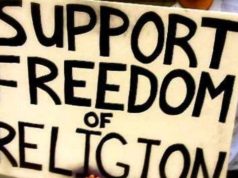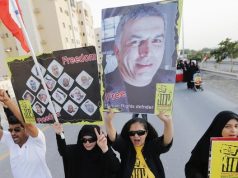- “The latest citizenship revocation of Bahraini nationals by Al-Khalifa regime is one the most notable sequel to the Sunni-ruling regime’s changing demographic balance of Bahrain that has begun since 1999.”
In January 2015, the Bahraini government has revoked the citizenship of 72 Bahrainis, most of them Shia, for “harming the interest of the Kingdom” (1), a harsh response, which was without a court or clear evidence, said Ali Abdulemam, a Bahraini blogger, whose citizenship is deprived and lives in exile, on Twitter. In November 2012, the regime deprived the nationality of 31 Bahraini Shias, among them are important opposition figures, on account of “being a threat to the state’s security”, an accusation that is considered “the vaguest reason for the deprivation of nationality”, said Philip Luther, Amnesty International’s director for the Middle East and North Africa. Also according to Joe Stork, deputy Middle East director at Human Rights Watch, “There is no justification for equating political dissent with damaging Bahrain’s security.” (2). Al-Khalifa regime’s practices are in clear violation of Article 15 of the Universal Declaration on Human Rights, which states that “everyone has the right to a nationality” and “no one shall be arbitrarily deprived of his nationality nor denied the right to change his nationality”. The government has violated this human right and has added these citizens to more than 2000 people (3), who are currently stateless and without nationality due to regime’s naturalization policies.
- “The regime began its demographic engineering in the 2000s. The king is carrying out a plan which seeks to transform Bahrain’s ethnic and religious identity. The regime has naturalized Pakistanis, Yemenis, Saudis, Jordanians, Syrians and others, giving them housing privileges and jobs in the security forces.”, Ali al-Fayez, a rights activist based in Manama (4)
The latest citizenship revocation of Bahraini nationals by Al-Khalifa regime is one of the most notable sequel to the Sunni-ruling regime’s changing demographic balance of Bahrain that has begun since 1999. Al-Khalifa regime has long been practicing demographic engineering by selectively giving citizenship to Sunnis from Pakistan, Saudi Arabia, Syria, Yemen, and Jordan, offering them housing privileges and giving them sensitive government jobs in security forces, while treating the majority Shia Bahrainis as outsiders. “It is ethnic cleansing; there is no other way to describe such demographic remapping. We are talking about over 100,000 migrants coming into Bahrain in between 2004 and 2010 — that we know of. Prior to that, between 2000 and 2004, 120,000 were artificially integrated into Bahrain.” said Ali al-Fayez, a Bahraini rights activist in an interview with MintPress News (4). Only taking the mentioned instances of naturalization into account, for Bahrain with a population of only 1.3 million people, this means that by 2012, the Sunni ruling Al-Khalifa has diluted the Shia majority by 17 percent. Call it demographic engineering or ethnic cleansing, such strategy is going to bolster the grips of the authoritarian Al-Khalifa on Bahrain, of which the King appoints all 40 members of the upper chamber of the parliament that must approve legislations, the prime minister, and judges in addition to declaring martial law and have to right to unilaterally pass certain types of regulations (5). This leaves only the lower chamber members to be elected by Bahrainis. The Bahrain Campaign, an NGO to promote democracy and social equality, has evaluated the latest Bahraini election according to basic principals in IDEA’s Book on International Electoral Standards, and has reported concerns about the social demographic engineering that is one of many factors that has undercut the credibility of the lower chamber of parliamentary election, and reflects the unfairness of the election and flaws of the political system in Bahrain (5).
The sectarian policies of the regime to crackdown on opposition by any means, especially after 2011 protests in which Al-Khalifa regime killed more than 80 people, along with aggressive demographic displacement, and discriminations against the Shia majority, has created another apartheid dictatorship in the Middle East that is prone to another socio-political turmoil. It is interesting to know that the Shia majority has not played the sectarian card, rather their tend to insisted on national unity and identity of Bahrainis, be it Shia or Sunni. Although Bahraini opposition activists emphasis on non-sectarianism nature of their cause, for Al-Khalifa, sectarianism is a weapon to crackdown on political critics. Al-Khalifa’s response to such consequences is cracking down on opposition through foreign military and security forces from Saudi Arabia and other GCC nations, and inciting “newly naturalized” Salafis to join security forces to respond to anything that challenges the authority of the King, even if it is a social media post that the King doesn’t like. (6)
The selective naturalization policy leads to instable and inharmonious society with socio-political consequences that can create further unrest. The dangerous practices of targeted naturalization, revocation of citizenship of Shia and sectarian discriminations practiced by Al-Khalifa is a recipe for more political backlash, violation of human rights and undermining freedom and democracy in Bahrain. It is expected that international community harmonize with the voices of human rights activists and pressure the Al-Khalifa government to refrain from such practices and support freedom and justice for all Bahrainis.
References
- Al Jazeera. Bahrain strips 72 of citizenship for ‘harming’ kingdom. [Online] Al Jazeera America, January 31, 2015. http://america.aljazeera.com/articles/2015/1/31/bahrain-revokes-citizenship-of-opposition.html.
- Abedine, Saad; Al-Arab, Mustafa. Bahrain strips Shiite activists of citizenship amid unrest. [Online] CNN, November 8, 2012. http://www.cnn.com/2012/11/07/world/meast/bahrain-activists-citizenship/index.html.
- Bahrain Center for Human Rights. Stateless in Bahrain. 2014.
- Shakdam, Catherine. Bahrain Using Targeted Immigration To Quell Political Dissent. MintPressNews. [Online] 12 3, 2014. http://www.mintpressnews.com/bahrain-is-using-targeted-immigration-to-quell-political-dissent/199527/.
- Bahrain Campaign. Bahrain watch || Between ballots and boycotts: Bahrain’s political and electoral systems assessed. s.l. : BC, 2014.
- Bahrain Center for Human Rights. Bahrain: Arrest of Nine Internet Users Over Social Media Posts. 2015.










